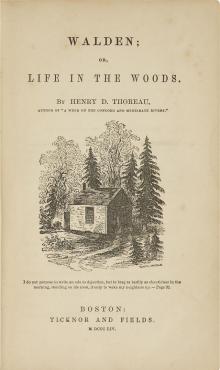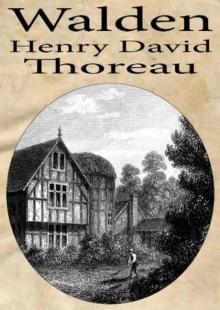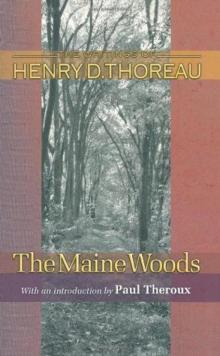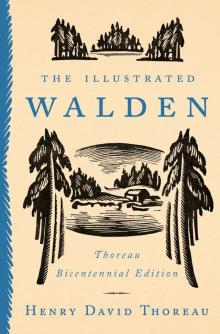- Home
- Henry David Thoreau
The Maine Woods (Writings of Henry D. Thoreau) Page 3
The Maine Woods (Writings of Henry D. Thoreau) Read online
Page 3
The very few settlers along this stream were obviously tempted by the cheapness of the land mainly. When I asked McCauslin why more settlers did not come in, he answered, that one reason was, they could not buy the land, it belonged to individuals or companies who were afraid that their wild lands would be settled, and so incorporated into towns, andthey be taxed for them; but to settling on the States� land there was no such hinderance. For his own part, he wanted no neighbors, -- he did n�t wish to see any road by his house. Neighbors, even the best, were a trouble and expense, especially on the score of cattle and fences. They might live across the river, perhaps, but not on the same side.
The chickens here were protected by the dogs. As McCauslin said, "The old one took it up first, and she taught the pup, and now they had got it into their heads that it would n�t do to have anything of the bird kind on the premises." A hawk hovering over was not allowed to alight, but barked off by the dogs circling underneath; and a pigeon, or a "yellow-hammer," as they called the pigeon-woodpecker, on a dead limb or stump, was instantly expelled. It was the main business of their day, and kept them constantly coming and going. One would rush out of the house on the least alarm given by the other.
When it rained hardest, we returned to the house, and took down a tract from the shelf. There was the Wandering Jew, cheap edition, and fine print, the Criminal Calendar, and Parish�s Geography, and flash novels two or three. Under the pressure of circumstances, we read a little in these. With such aid, the press is not so feeble an engine, after all. This house, which was a fair specimen of those on this river, was built of huge logs, which peeped out everywhere, and were chinked with clay and moss. It contained four or five rooms. There were no sawed boards, or shingles, or clapboards, about it; and scarcely any tool but the axe had been used in its construction. The partitions were made of long clapboard-like splints, of spruce or cedar, turned to a delicate salmon color by the smoke. The roof and sides were covered with the same, instead of shingles and clapboards, and some of a much thicker and larger size were used for the floor. These were all so straight and smooth, that they answered the purpose admirably; and a careless observer would not have suspected that they were not sawed and planed. The chimney and hearth were of vast size, and made of stone. The broom was a few twigs of arbor-vitae tied to a stick; and a pole was suspended over the hearth, close to the ceiling, to dry stockings and clothes on. I noticed that the floor was full of small,dingy holes, as if made with a gimlet, but which were, in fact, made by the spikes, nearly an inch long, which the lumberers wear in their boots to prevent their slipping on wet logs. Just above McCauslin�s, there is a rocky rapid, where logs jam in the spring; and many "drivers" are there collected, who frequent his house for supplies; these were their tracks which I saw.
At sundown McCauslin pointed away over the forest, across the river, to signs of fair weather amid the clouds, -- some evening redness there. For even there the points of compass held; and there was a quarter of the heavens appropriated to sunrise and another to sunset.
The next morning, the weather proving fair enough for our purpose, we prepared to start, and, the Indians having failed us, persuaded McCauslin, who was not unwilling to revisit the scenes of his driving, to accompany us in their stead, intending to engage one other boatman on the way. A strip of cotton cloth for a tent, a couple of blankets, which would suffice for the whole party, fifteen pounds of hard bread, ten pounds of "clear" pork, and a little tea, made up "Uncle George�s" pack. The last three articles were calculated to be provision enough for six men for a week, with what we might pick up. A tea-kettle, a frying-pan, and an axe, to be obtained at the last house, would complete our outfit.
We were soon out of McCauslin�s clearing, and in the ever green woods again. The obscure trail made by the two settlers above, which even the woodman is sometimes puzzled to discern, erelong crossed a narrow, open strip in the woods overrun with weeds, called the Burnt Land, where a fire had raged formerly, stretching northward nine or ten miles, to Millinocket Lake. At the end of three miles, we reached Shad Pond, or Noliseemack, an expansion of the river. Hodge, the Assistant State Geologist, who passed through this on the 25th of June, 1837, says, "We pushed our boat through an acre or more of buck- beans, which had taken root at the bottom, and bloomed above the surface in the greatest profusion and beauty." Thomas Fowler�s house is four miles from McCauslin�s, on the shore of the pond, at the mouth of the Millinocket River, and eight miles from the lake of the same name, on the latter stream. This lake affords a more directcourse to Ktaadn, but we preferred to follow the Penobscot and the Pamadumcook lakes. Fowler was just completing a new log-hut, and was sawing out a window through the logs, nearly two feet thick, when we arrived. He had begun to paper his house with spruce-bark, turned inside out, which had a good effect, and was in keeping with the circumstances. Instead of water we got here a draught of beer, which, it was allowed, would be better; clear and thin, but strong and stringent as the cedar-sap. It was as if we sucked at the very teats of Nature�s pine-clad bosom in these parts, -- the sap of all Millinocket botany commingled, -- the topmost, most fantastic, and spiciest sprays of the primitive wood, and whatever invigorating and stringent gum or essence it afforded steeped and dissolved in it, -- a lumberer�s drink, which would acclimate and naturalize a man at once, -- which would make him see green, and, if he slept, dream that he heard the wind sough among the pines. Here was a fife, praying to be played on, through which we breathed a few tuneful strains, -- brought hither to tame wild beasts. As we stood upon the pile of chips by the door, fish-hawks were sailing overhead; and here, over Shad Pond, might daily be witnessed the tyranny of the bald-eagle over that bird. Tom pointed away over the lake to a bald-eagle�s nest, which was plainly visible more than a mile off, on a pine, high above the surrounding forest, and was frequented from year to year by the same pair, and held sacred by him. There were these two houses only there, his low hut and the eagles� airy cart-load of fagots. Thomas Fowler, too, was persuaded to join us, for two men were necessary to manage the batteau, which was soon to be our carriage, and these men needed to be cool and skilful for the navigation of the Penobscot. Tom�s pack was soon made, for he had not far to look for his waterman�s boots, and a red-flannel shirt. This is the favorite color with lumbermen; and red flannel is reputed to possess some mysterious virtues, to be most healthful and convenient in respect to perspiration. In every gang there will be a large proportion of red birds. We took here a poor and leaky batteau, and began to pole up the Millinocket two miles, to the elder Fowler�s, in order to avoid the Grand Falls of the Penobscot, intending to exchange our batteau there for a better. The Millinocket is asmall, shallow, and sandy stream, full of what I took to be lamprey-eels� or suckers� nests, and lined with musquash cabins, but free from rapids, according to Fowler, excepting at its outlet from the lake. He was at this time engaged in cutting the native grass, -- rush-grass and meadow-clover, as he called it, -- on the meadows and small, low islands of this stream. We noticed flattened places in the grass on either side, where, he said, a moose had laid down the night before, adding, that there were thousands in these meadows.
Old Fowler�s, on the Millinocket, six miles from McCauslin�s, and twenty-four from the Point, is the last house. Gibson�s, on the Sowadnehunk, is the only clearing above, but that had proved a failure, and was long since deserted. Fowler is the oldest inhabitant of these woods. He formerly lived a few miles from here, on the south side of the West Branch, where he built his house sixteen years ago, the first house built above the Five Islands. Here our new batteau was to be carried over the first portage of two miles, round the Grand Falls of the Penobscot, on a horse-sled made of saplings, to jump the numerous rocks in the way; but we had to wait a couple of hours for them to catch the horses, which were pastured at a distance, amid the stumps, and had wandered still farther off. The last of the salmon for this season had just been caught, and were still fresh in pickle, from which enough was extracted to fill our empty kettle, and so g
raduate our introduction to simpler forest fare. The week before they had lost nine sheep here out of their first flock, by the wolves. The surviving sheep came round the house, and seemed frightened, which induced them to go and look for the rest, when they found seven dead and lacerated, and two still alive. These last they carried to the house, and, as Mrs. Fowler said, they were merely scratched in the throat, and had no more visible wound than would be produced by the prick of a pin. She sheared off the wool from their throats, and washed them, and put on some salve, and turned them out, but in a few moments they were missing, and had not been found since. In fact, they were all poisoned, and those that were found swelled up at once, so that they saved neither skin nor wool. This realized the old fables of the wolves and the sheep, and convinced me that that ancienthostility still existed. Verily, the shepherd-boy did not need to sound a false alarm this time. There were steel traps by the door, of various sizes, for wolves, otter, and bears, with large claws instead of teeth, to catch in their sinews. Wolves are frequently killed with poisoned bait.
At length, after we had dined here on the usual backwoods fare, the horses arrived, and we hauled our batteau out of the water, and lashed it to its wicker carriage, and, throwing in our packs, walked on before, leaving the boatmen and driver, who was Tom�s brother, to manage the concern. The route, which led through the wild pasture where the sheep were killed, was in some places the roughest ever travelled by horses, over rocky hills, where the sled bounced and slid along, like a vessel pitching in a storm; and one man was as necessary to stand at the stern, to prevent the boat from being wrecked, as a helmsman in the roughest sea. The philosophy of our progress was something like this: when the runners struck a rock three or four feet high, the sled bounced back and upwards at the same time; but, as the horses never ceased pulling, it came down on the top of the rock, and so we got over. This portage probably followed the trail of an ancient Indian carry round these falls. By two o�clock we, who had walked on before, reached the river above the falls, not far from the outlet of Quakish Lake, and waited for the batteau to come up. We had been here but a short time, when a thunder-shower was seen coming up from the west, over the still invisible lakes, and that pleasant wilderness which we were so eager to become acquainted with; and soon the heavy drops began to patter on the leaves around us. I had just selected the prostrate trunk of a huge pine, five or six feet in diameter, and was crawling under it, when, luckily, the boat arrived. It would have amused a sheltered man to witness the manner in which it was unlashed, and whirled over, while the first water- spout burst upon us. It was no sooner in the hands of the eager company than it was abandoned to the first revolutionary impulse, and to gravity, to adjust it; and they might have been seen all stooping to its shelter, and wriggling under like so many eels, before it was fairly deposited on the ground. When all were under, we propped up the lee side, and busied ourselves there whittling thole-pins for rowing, when weshould reach the lakes; and made the woods ring, between the claps of thunder, with such boat-songs as we could remember. The horses stood sleek and shining with the rain, all drooping and crestfallen, while deluge after deluge washed over us; but the bottom of a boat may be relied on for a tight roof. At length, after two hours� delay at this place, a streak of fair weather appeared in the northwest, whither our course now lay, promising a serene evening for our voyage; and the driver returned with his horses, while we made haste to launch our boat, and commence our voyage in good earnest.
There were six of us, including the two boatmen. With our packs heaped up near the bows, and ourselves disposed as baggage to trim the boat, with instructions not to move in case we should strike a rock, more than so many barrels of pork, we pushed out into the first rapid, a slight specimen of the stream we had to navigate. With Uncle George in the stern, and Tom in the bows, each using a spruce pole about twelve feet long, pointed with iron, and poling on the same side, we shot up the rapids like a salmon, the water rushing and roaring around, so that only a practised eye could distinguish a safe course, or tell what was deep water and what rocks, frequently grazing the latter on one or both sides, with a hundred as narrow escapes as ever the Argo had in passing through the Symplegades. I, who had had some experience in boating, had never experienced any half so exhilarating before. We were lucky to have exchanged our Indians, whom we did not know, for these men, who, together with Tom�s brother, were reputed the best boatmen on the river, and were at once indispensable pilots and pleasant companions. The canoe is smaller, more easily upset, and sooner worn out; and the Indian is said not to be so skilful in the management of the batteau. He is, for the most part, less to be relied on, and more disposed to sulks and whims. The utmost familiarity with dead streams, or with the ocean, would not prepare a man for this peculiar navigation; and the most skilful boatman anywhere else would here be obliged to take out his boat and carry round a hundred times, still with great risk, as well as delay, where the practised batteau-man poles up with *
comparative ease and safety. The hardy "voyageur" pushes with incredible perseverance and success quite up to the foot of the falls, and then only carries round some perpendicular ledge, and launches again in
"The torrent�s smoothness, ere it dash below,"
to struggle with the boiling rapids above. The Indians say that the river once ran both ways, one half up and the other down, but that, since the white man came, it all runs down, and now they must laboriously pole their canoes against the stream, and carry them over numerous portages. In the summer, all stores -- the grindstone and the plough of the pioneer, flour, pork, and utensils for the explorer -- must be conveyed up the river in batteaux; and many a cargo and many a boatman is lost in these waters. In the winter, however, which is very equable and long, the ice is the great highway, and the loggers� team penetrates to Chesuncook Lake, and still higher up, even two hundred miles above Bangor. Imagine the solitary sled-track running far up into the snowy and evergreen wilderness, hemmed in closely for a hundred miles by the forest, and again stretching straight across the broad surfaces of concealed lakes!
We were soon in the smooth water of the Quakish Lake, and took our turns at rowing and paddling across it. It is a small, irregular, but handsome lake, shut in on all sides by the forest, and showing no traces of man but some low boom in a distant cove, reserved for spring use. The spruce and cedar on its shores, hung with gray lichens, looked at a distance like the ghosts of trees. Ducks were sailing here and there on its surface, and a solitary loon, like a more living wave, -- a vital spot on the lake�s surface, -- laughed and frolicked, and showed its straight leg, for our amusement. Joe Merry Mountain appeared in the northwest, as if it were looking down on this lake especially; and we had our first, but a partial view of Ktaadn, its summit veiled in clouds, like a dark isthmus in that quarter, connecting the heavens with the earth. After two miles of smooth rowing across this lake, we found ourselves in the river again, which was a continuous rapid for one mile, to the dam, requiring all the strength and skill of our boatmen to pole up it.
This dam is a quite important and expensive work for this country, whither cattle and horses cannot penetrate in the summer, raising the whole river ten feet, and flooding, as they said, som sixty square miles by means of the innumerable lakes with which the river connects. It is a lofty and solid structure, with sloping piers some distance above, made of frames of logs filled with stones, to break the ice. Here every log pays toll as it passes through the sluices.
We filed into the rude logger�s camp at this place, such as I have described, without ceremony, and the cook, at that moment the sole occupant, at once set about preparing tea for his visitors. His fireplace, which the rain had converted into a mud-puddle, was soon blazing again, and we sat down on the log benches around it to dry us. On the well-flattened and somewhat faded beds of arbor-vitae leaves, which stretched on either hand under the eaves behind us, lay an odd leaf of the Bible, some genealogical chapter out of the Old Testament; and, half buried by the leaves, we
found Emerson�s Address on West India Emancipation, which had been left here formerly by one of our company, and had made two converts to the Liberty party here, as I was told; also, an odd number of the Westminster Review, for 1834, and a pamphlet entitled History of the Erection of the Monument on the grave of Myron Holly. This was the readable, or reading matter, in a lumberer�s camp in the Maine woods, thirty miles from a road, which would be given up to the bears in a fortnight. These things were well thumbed and soiled. This gang was headed by one John Morrison, a good specimen of a Yankee; and was necessarily composed of men not bred to the business of dam-building, but who were Jacks-at-all-trades, handy with the axe, and other simple implements, and well skilled in wood and water craft. We had hot cakes for our supper even here, white as snow-balls, but without butter, and the never-failing sweet cakes, with which we filled our pockets, foreseeing that we should not soon meet with the like again. Such delicate puff-balls seemed a singular diet for *
back-woodsmen. There was also tea without milk, sweetened with molasses. And so, exchanging a word with John Morrison and his gang when we had returned to the shore, and also exchanging our batteau for a better still, we made haste to improve the little daylight that remained. This camp, exactly twenty-nine miles from Mattawamkeag Point, by the way we had come, and about one hundred from Bangor by the river, was the last human habitation of any kind in this direction. Beyond, there was no trail; and the river and lakes, by batteaux and canoes, was considered the only practicable route. We were about thirty miles by the river from the summit of Ktaadn, which was in sight, though not more than twenty, perhaps, in a straight line.
It being about the full of the moon, and a warm and pleasant evening, we decided to row five miles by moonlight to the head of the North Twin Lake, lest the wind should rise on the morrow. After one mile of river, or what the boatmen call "thoroughfare," -- for the river becomes at length only the connecting link between the lakes, -- and some slight rapid which had been mostly made smooth water by the dam, we entered the North Twin Lake just after sundown, and steered across for the river "thoroughfare," four miles distant. This is a noble sheet of water, where one may get the impression which a new country and a "lake of the woods" are fitted to create. There was the smoke of no log-hut nor camp of any kind to greet us, still less was any lover of nature or musing traveller watching our batteau from the distant hills; not even the Indian hunter was there, for he rarely climbs them, but hugs the river like ourselves. No face welcomed us but the fine fantastic sprays of free and happy evergreen trees, waving one above another in their ancient home. At first the red clouds hung over the western shore as gorgeously as if over a city, and the lake lay open to the light with even a civilized aspect, as if expecting trade and commerce, and towns and villas. We could distinguish the inlet to the South Twin, which is said to be the larger, where the shore was misty and blue, and it was worth the while to look thus through a narrow opening across the entire expanse of a concealed lake to its own yet more dim and distant shore. The shores rose gently to ranges of low hills covered with forests; and though,in fact, the most valuable white pine timber, even about this lake, had been culled out, this would never have been suspected by the voyager. The impression, which indeed corresponded with the fact, was, as if we were upon a high table-land between the States and Canada, the northern side of which is drained by the St. John and Chaudiere, the southern by the Penobscot and Kennebec. There was no bold mountainous shore, as we might have expected, but only isolated hills and mountains rising here and there from the plateau. The country is an archipelago of lakes, -- the lake-country of New England. Their levels vary but a few feet, and the boatmen, by short portages, or by none at all, pass easily from one to another. They say that at very high water the Penobscot and the Kennebec flow into each other, or at any rate, that you may lie with your face in the one and your toes in the other. Even the Penobscot and St. John have been connected by a canal, so that the lumber of the Allegash, instead of going down the St. John, comes down the Penobscot; and the Indian�s tradition, that the Penobscot once ran both ways for his convenience, is, in one sense, partially realized to-day.

 Life Without Principle
Life Without Principle Walden
Walden Walden by Henry David Thoreau
Walden by Henry David Thoreau The Maine Woods (Writings of Henry D. Thoreau)
The Maine Woods (Writings of Henry D. Thoreau) The Illustrated Walden
The Illustrated Walden The Essays of Henry D. Thoreau
The Essays of Henry D. Thoreau